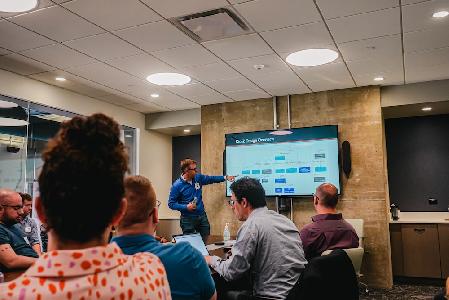It’s almost the year 2020, which means the federal government’s constitutionally mandated decennial census is just around the corner.
To date, there have been 22 censuses since the first one in 1790. But there’s going to be something different about next year’s: For the first time, the census will largely be conducted online.
It’s a logical next step for the 21st-century census, which will now only require 50,000 fieldworkers instead of 150,000. However, allowing the opportunity for U.S. residents to respond to census questions online presents various obstacles that’ll need to be addressed, such as the possibility hacking; Australia learned this the hard way when its inaugural online census was hacked in 2016, causing a $21 million setback.
But the online census poses another issue that’s on a much smaller and more local scale. The problem is that lots of people across the country have difficulty accessing the internet, oftentimes due to a lack of resources. This is especially true for Philadelphia.
“This is no secret, but Philly has challenges with rates of online access, internet access and adoption rate,” said Andrew Buss, the City of Philadelphia’s deputy CIO of innovation management. “It’s largely tied to poverty.”
As the group thought about its grant cycle for this year, we were looking for an issue of importance and timeliness. Obviously the census came up.
It poses an essential question: How are we going to get the nearly 30% of Philadelphians who don’t have internet access in their homes to respond to the census survey? Buss’ Office of Innovation & Technology (OIT) has an idea.
OIT is just one of a number of entities affiliated with the Digital Literacy Alliance (DLA), a 19-organization collective born out of the Mayor’s Fund for Philadelphia that gives grants for digital literacy initiatives. The past two years, DLA has funded projects focusing on a variety of technology-related issues in the city, ranging from spotting fake news to tablet training sessions for senior citizens. In the past, DLA has allowed applicants to pitch their projects so long as they were tied to one of a few subject areas the DLA was offering grants for.
But this year, there’s only one subject area: the 2020 census.
“As the group thought about its grant cycle for this year,” Buss explained, “we were looking for an issue of importance and timeliness. Obviously the census came up and that seemed like a really good thing to focus on.”
As a result, DLA announced today that it will divvy out $200,000 this year to worthy recipients who are looking to help under-resourced Philadelphians complete their census surveys by way of the internet. The individual grants will be between $10,000 and $25,000 for individual organizations. If multiple organizations team up on a proposal, they can be allotted up to $40,000. (See the full grant guidelines here.)
“That’s generally the range we’ve used in past cycles,” Buss said. “It’s pretty good as far as giving some of the smaller organizations a meaningful amount of money they can do a nice program with.”
Back in January of this year, the city launched Philly Counts 2020, an office designed to support the federal government’s census efforts in Philadelphia by helping educate the public on how to participate in the census, among other things. But Stephanie Reid, the office’s executive director, also thinks of the census as another way to help bridge the digital divide.
I'm thinking about how does this impact far beyond the census, and I think that's a really important piece of how we need to approach all of this work.
“I’m not just looking at what happen[s] with the census,” she said, “I’m thinking about how does this impact far beyond the census, and I think that’s a really important piece of how we need to approach all of this work.”
In other words, if the city can provide people with the skills and resources necessary to respond to the census online, they can use those same resources to use the internet for other things, such as paying their bills, reading the news or applying for jobs. The skills are transferable.
Not only does the census have the potential for getting the digital ball rolling for many impoverished Philadelphians, but it’s also important for the city as a whole, funding-wise. There’s about $675 billion that gets allocated nationally based on census data. Right now, Philadelphia gets about $3.3 billion of that pot annually.
Despite the high stakes for Philly, DLA knows getting everybody to respond to the census survey will be tough.
“We know Philadelphia is a city of neighborhoods,” said Reid. “Nobody likes to go more than three or four blocks to get anywhere, so being very intentional about identifying lots of hyperlocal places is important.”
An example of a hyperlocal place might be any one of the locations that’s a part of the city’s KEYSPOT program, which was created in 2010. KEYSPOT consists of a network of more than 50 community-based public access centers located in public, private and nonprofit organizations where residents can use computers outfitted with the world wide web.
“We know that we have some work to do around access to internet in the city,” Reid said. “I think that grant opportunities like this are going to be key to the success of that.”
Join the conversation!
Find news, events, jobs and people who share your interests on Technical.ly's open community Slack

Philly daily roundup: Student-made college cost app; Central High is robotics world champ; Internet subsidy expiration looms

Philly daily roundup: Earth Day glossary; Gen AI's energy cost; Biotech incubator in Horsham

Gain knowledge and skills at the Technical.ly Developers Conference during Philly Tech Week 2024

